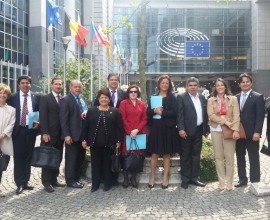Costa Rica feeds on the success of the European Regional Policy
The working tour of the First Lady of the Republic, Mercedes Peñas Domingo, and ten senior state officials and representatives culminates in Belgium and Spain
Knowledge of best practices of regional articulation in the European Union will enrich the work being carried out by the Government of the Republic of Costa Rica to stimulate development within its territories and for the benefit of its own people. Today saw the end of the working tour around Belgium and Spain of some 10 senior officials of the executive and legislative branches of government and other state institutions, which also included the participation of the First Lady of the Republic, Mercedes Peñas Domingo, in her capacity as leader of the Tejiendo Desarrollo [Weaving Development] programme launched by her office.
The tour included knowledge exchange sessions with EU institutions held between 29th June and 3rd July, regarding the successful design and implementation of the European Regional Policy. The tour was funded with the collaboration of EUROsociAL, a European Commission programme for cooperation between Europe and Latin America.
The delegation was able to learn about the political foundations that support the European Regional Policy, the development and social cohesion strategy of which has proven to be successful in promoting endogenous and sustainable development processes.
For example, in European regions, Regional Development Funds are distributed based on criteria for reducing territorial inequalities, explained Peñas.
“During these sessions we have discussed the importance of regional development policies having an infrastructure projects component, but we have also discussed support for productive systems, entrepreneurship, SMEs, increasing the added value of products and territorial innovation in particular”, said the First Lady.
The delegation also visited the Brussels region in Belgium and the office of the autonomous region of Extremadura in Brussels. Here they learned about the application of the regional policy with regard to five major objectives: innovation in agro-industry and energy; research applied to the productive fabric; youth entrepreneurship; natural, cultural and gastronomic tourism; and the specific project for the Minimally Invasive Surgery Centre in Caceres.
These initiatives, examples of European practice, serve to reaffirm the driving motivation behind the Tejiendo Desarrollo programme and one of the pillars of the Solís Rivera Administration in terms of economic growth and employment creation: specific projects that serve as engines for territorial development.

